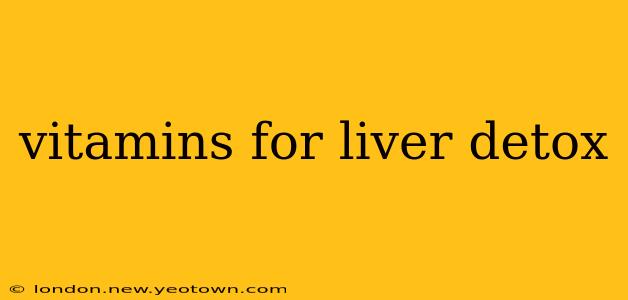Our livers, unsung heroes of our bodies, work tirelessly, filtering toxins from our blood and performing hundreds of other vital functions. But sometimes, our livers need a little extra support. This isn't about a "quick detox" fad, but rather about providing the nutrients necessary for optimal liver function and supporting its natural detoxification processes. This journey isn't a sprint; it's a marathon of healthy choices, and certain vitamins can play a crucial role. Let's explore how.
What are the best vitamins for liver health?
The concept of a "liver detox" often conjures up images of extreme cleanses, but the truth is simpler and more sustainable. Focusing on a healthy lifestyle and providing your liver with the building blocks it needs is the most effective approach. Several vitamins are particularly important for liver function:
- Vitamin B12: Essential for cell growth and repair, including liver cells. A deficiency can impair liver function.
- Vitamin C: A powerful antioxidant that combats free radicals that can damage liver cells. It also helps with collagen production, essential for liver tissue repair.
- Vitamin D: Studies show a connection between vitamin D deficiency and non-alcoholic fatty liver disease (NAFLD). Maintaining sufficient levels is important for liver health.
- Vitamin E: Another potent antioxidant, Vitamin E helps protect liver cells from oxidative stress.
- Vitamin K: Crucial for blood clotting, and since the liver plays a key role in blood clotting, adequate Vitamin K is important.
What are the benefits of taking vitamins for liver health?
These vitamins don't magically "cleanse" your liver. Instead, they support its natural functions. Benefits include:
- Improved Liver Function: By providing essential nutrients, these vitamins help the liver perform its detoxification and metabolic processes more effectively.
- Reduced Oxidative Stress: Antioxidants like vitamins C and E protect liver cells from damage caused by free radicals.
- Enhanced Liver Regeneration: Vitamins contribute to cell repair and regeneration, aiding in the healing process from liver injuries or disease.
- Support for Liver Diseases: While not a cure, these vitamins can support the management of certain liver conditions, under the guidance of a doctor.
Are there any side effects of taking liver detox vitamins?
Generally, these vitamins are safe when taken at recommended doses. However, excessive intake can lead to side effects. Always consult a healthcare professional before starting any new supplement regimen, especially if you have underlying health conditions or are taking medications. They can assess your individual needs and determine appropriate dosages.
Do liver detox vitamins really work?
The effectiveness of vitamins for liver health depends on various factors, including your overall health, lifestyle, and the severity of any liver issues. While they won't magically "detox" your liver, they provide essential support for its natural functions. The focus should be on long-term healthy habits, including a balanced diet, regular exercise, and appropriate supplementation.
What foods are good for liver health?
A healthy diet is crucial for liver health. Focus on foods rich in antioxidants, such as:
- Leafy green vegetables: Spinach, kale, and collard greens are excellent sources of vitamins and minerals.
- Cruciferous vegetables: Broccoli, cauliflower, and Brussels sprouts support liver detoxification pathways.
- Berries: Blueberries, strawberries, and raspberries are rich in antioxidants.
- Avocado: A good source of healthy fats, avocado supports liver function.
- Garlic: Possesses compounds that protect the liver from damage.
- Grapefruit: Contains antioxidants that may help protect the liver.
Can vitamins help with alcoholic liver disease?
While vitamins are beneficial for overall liver health, they aren't a treatment for alcoholic liver disease (ALD). ALD requires medical intervention and lifestyle changes, including abstinence from alcohol. If you suspect you have ALD, consult a doctor immediately.
What are the signs of a damaged liver?
Several symptoms may indicate liver damage, including:
- Fatigue: Feeling consistently tired.
- Jaundice: Yellowing of the skin and eyes.
- Abdominal swelling: Fluid buildup in the abdomen.
- Dark urine: Urine that is darker than usual.
- Pale stools: Stools that are lighter than normal.
- Nausea and vomiting: Frequent feelings of nausea or vomiting.
Disclaimer: This information is for educational purposes only and should not be considered medical advice. Always consult a healthcare professional before starting any new supplement regimen or if you have concerns about your liver health. They can diagnose any underlying issues and provide personalized recommendations.

